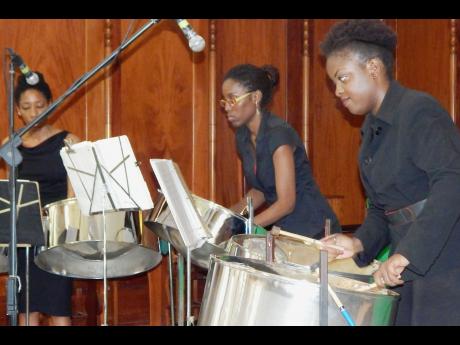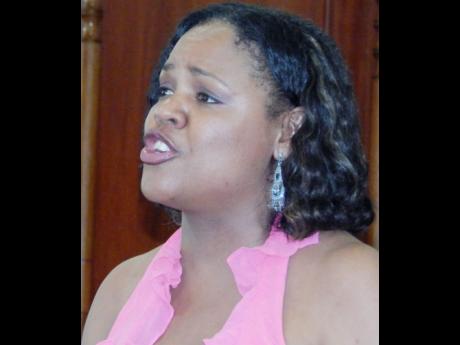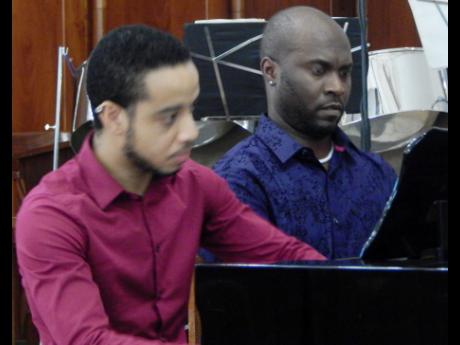Classics and a cause
This year, the annual Classics in June concert, sponsored by the Kingston Soroptomist Club, was staged on Sunday. It was Father's Day and the item which got the loudest applause was dedicated to a father. It was the popular DuBose Heyward-George Gershwin aria Summertime (an' the Livin' is Easy) from the 1935 opera Porgy and Bess.
The dedication was made by cellist Emily Dixon, who sang the song while playing her instrument. Her mother, Angela Elliott, accompanied her on piano.
As it happened, the item brought the generally well-received two-hour concert at the chapel, University of the West Indies, Mona, to a close. And though they did not have the sentimental attachment that Dixon gave to Summertime, most of the other items were at least as well performed and got a good reception.
So, once again, the Soroptomist Club linked a good show to a good cause - the proceeds from the annual concerts assist the National Children's Home and other organisations for children at risk.
Soprano Nomali Lumsden opened the musical component, which also contained quite a bit of talking from the multilingual emcee Dervan Malcolm and others. Lumsden described her first song, John Dowland's Come Again, Sweet Love as "a very popular Renaissance piece".
A gentle love song, it was followed by the more dynamic and dramatic Henry Purcell piece Hark! The Ech'ing Air from The Fairie Queen. The singer was accompanied by Stephen Shaw-Naar on piano.
SUBLIME BEAUTY
A mini steel band followed, playing two sublimely beautiful tunes, Johann Pachelbel's Canon in D and Bach's Jesu Joy of Man's Desiring. The Chrome Steel Ensemble consisted of Rhodene Watson on tenor pan, Raisha Lovindeer King on double tenor pan and Jodi-Ann Lawrence on guitar pan. As unusual as playing the two well-known pieces on steel drums would have been, the audience indicated its approval by applause.
Another unusual act was next. Shaw-Naar, who is best known as a pianist, stepped up to the microphone to sing - and in a most uncommon way, as a counter-tenor. Accompanied by Monique Harrison on violin, Dixon on cello and Karl Van Richards on piano, Shaw-Naar sang A Dispetto (Handel) in his falsetto voice.
Later, with Richard accompanying him, Shaw-Naar returned with three other Gabriel Faure songs. The energy and clarity he demonstrates at the piano seems to entirely desert him when he sings.
Happily, he was back on top form minutes later to play with Richards (on the single grand piano) the long, complex Fantasie in F minor by Franz Schubert. This brought the concert's first half to a close.
The composer's fantasy might well have been about a bucolic adventure through a green field with grazing cattle by a gentle stream flowing from low hills, ending in a sunset of pink clouds - though a few strong passages in the middle of the piece did suggest a quick thunderstorm.
EXCITEMENT
The glorious voice of Alcorn State University, Mississippi, student Danielle Watson opened the concert's second half. She sang Mozart's Das Veilchen and Porgi Amor (from The Marriage of Figaro). After the show, she told The Gleaner how joining the performing arts group Nexus caused her to fall in love with classical music and a CHASE fund scholarship enabled her to get to the university.
"I feel excited at the progress I'm making vocally studying with Dr Byron Johnson," Watson said. "He is great." Slated to graduate in December 2017, she anticipates wonderful developments by then.
Cesar Franck's plaintive Allegro moderato from his Sonata in A major was played with appropriate feeling by Harrison on violin and Shaw-Naar on piano. The Dixon/Elliott pair ended the concert with the cheerful Le Cygne (The Swan) by Camille Saint-Saens and the aforementioned Summertime, which was played in jazz style.
The reason for that style was made clear when Dixon announced the piece. She said, "This is dedicated to my father, a lover of jazz."
Richards, who was playing at Classics in June for the fourth time, told The Gleaner that, after teaching for four years, he stopped to focus on performing. However, he still teaches master classes to university students.
Chair of the Classics in June committee, Laurice Barnaby, thanked the numerous sponsors of the event.




